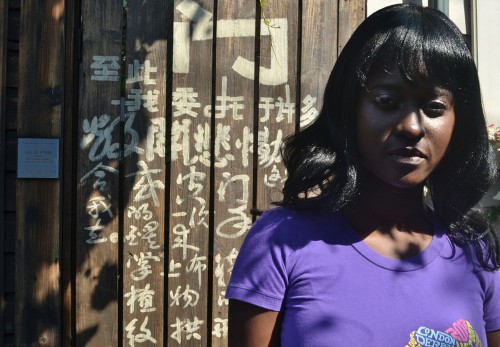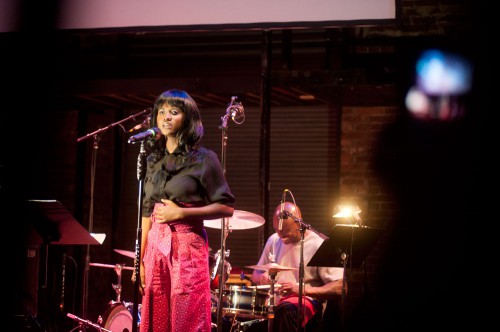“Poetry is always spoken”: An interview with TJ Dema
by Joshua Barnes / September 26, 2012 / 1 Comment
“Poet TJ Dema [is] on top of the world,” says BKO, an online poetry and literary magazine that credits her as “Botswana’s most amazing poetry talent.” Currently Tjawangwa TJ Dema is in the states participating in the 46th Annual International Writing Program hosted by the University of Iowa. She also recently visited Pittsburgh to perform at City of Asylum/Pittsburgh’s Jazz Poetry Concert where her performative, spoken word poetry was backed by the musical stylings of Oliver Lake’s steel quartet. Despite the labels, however, Dema refers to herself simply as a poet, noting that in her culture poetry is always spoken or performed. Still she has commanded stages all around the world for over a decade and her audience extends beyond her home in Botswana to neighboring South Africa and Zimbabwe, India, the United Kingdom, France, the United States, and more.
Dema is an editor, anthologized poet, a member of the international poetry and music ensemble Sonic Slam Chorus, a chair of the Writer’s Association of Botswana, and founding member of Exoduslivepoetry! The organization coordinated the Infinite Word Festival, Botswana’s sole annual poetry festival until 2010 when Legodile ‘Dredd X’ Seganabeng began holding the Maun International Poetry Festival. She also runs Sauti Arts and Performance Management, a company that nourishes the talents of Batswana artists and has recently curated a multilingual CD anthology, Dreaming is a Gift for Me. Her work has been translated into French and Chinese.
Sampsonia Way spoke* with TJ Dema the morning before the Jazz Poetry Concert. In this interview she discusses the changing landscape of Botwana’s poetry, the importance of anthologies, the difficulties of making it as a full-time writer in Botswana, and why she needs to hear words.
*Additional questions contributed by Darah Patterson
Talk about Botswana’s tradition of oral poetry in relation to the new work that young Batswana performance poets are doing. Is there a tension between the old and the new? How do they coexist?
This generation of poets is focusing on an individual, contemporary history—a lot of “I” poetry—versus the traditional role of poetry in Botswana which was communal, where the poet was a custodian of the people’s stories. There is a language difference as well. New poets write primarily in English, but traditionally the writing was done either in Setswana, which is the national language, or in tribal languages. They’re worried that if we new poets are becoming the face of Botswana’s poetry—because we are the ones working mainly in the city, we are the ones doing the interviews, traveling, etc.—are we really a comprehensive reflection of Botswana’s poetry?
So there’s no tension, because if there were it would be directed towards me at the moment (laughs), but there is dialogue and I think that’s important. There is a place for those questions and we need to engage with them more and think about how important is it for us to concern ourselves with the international idea of what Botswana’s poetry is. Is that the primary concern? Is the worry that now all of the young poets will be thinking “I have to write in English if I am to find some sort of success?”
How is the dialogue manifested? Via poetry? In meetings?
It’s not so organized. The space is not so structured because art is valued in Botswana, but it’s an emotional value rather than an economic or a financial one that you might invest in to structure programs or provide poets a space where they can speak. So we have to steal spaces. Somebody builds a café, we approach them and say we would like to host an open mic night and then we come into that space. Over time meeting in these spaces has created relationships between different poets and writers and some academics from the university, who are coming from a kind of Shakespearean, textbook approach to poetry.
The dialogue isn’t happening within the poetry so much now. I think that has a little bit to do with the fact that majority—almost 85% if not 90%— of the spoken word poets are people under 30, and you concern yourself with different issues at that age. It’s much more to impress the boyfriend or the girlfriend, to get on stage and gain applause, rather than discussing what the issues of the day are. But I think that will change. I am not that young anymore. I am 31 and thinking much more broadly beyond my personal narrative. I think that will happen for more poets, and then we will be able to use our craft to dialogue the things that are important to us.
“It seems to be in the people’s DNA to listen to poetry…their ears are attuned to it.”
Has the younger generation brought a new audience to poetry in Botswana?
It has. Gaborone has about 250,000 people living in it. When you host a reading, if you bill a certain number of spoken word poets—the implication being that most of them will perform in English—you draw a really diverse audience visually, ethnically, and in terms of age: You’ll have a young Chinese student who’s just started secondary school, a Caucasian couple in their sixties, and the locals in all their breadth and beauty. Two hundred and fifty to five hundred people come out to these readings once a month.
It seems to be in the people’s DNA to listen to poetry; people’s ears are much more attuned to it. There is definitely way less reading of printed poetry. We have very few bookshops and they don’t sell much poetry. The publishers aren’t really interested in printing it either, unless they can get you into a school textbook, because then the government will buy in bulk for all of the students, which justifies some of the expense.
How would you compare the poetic movement to popular music in Botswana?
Popular music is very much geared towards a certain age group. I’m not sure what the ceiling for that age group is, but it’s probably the mid-twenties. You get almost exclusively local students coming out for those shows, which are mainly dance music with a lot of talking over it. So it’s nowhere near as diverse as the audience that you get for poetry. I would also argue that some of the people who come out for poetry would never be caught dead at any of those music shows, and vice versa.
Your solo pieces, the work that you’ve done with Sonic Slam Chorus, and the CD that you compiled and released, Dreaming is a Gift to Me, seem to blur the line between music and poetry.
Traditionally there wasn’t a separation between music and poetry in Botswana. It’s strange for me to be a poster girl for spoken word now and to be referring to the tradition of poetry so much, but it is a huge reference point for me. Whether I am running away from that tradition or towards it, it’s still the thing that defines poetry for me.
When I grew up, before my generation took up spoken word, the only poetry we heard was traditional poetry. For them there was no distinction between music and poetry. If you started speaking, some guy might start playing, and a lot of what they called the music of the day was really a guy reciting his poem and playing the instrument himself. So I never thought that you had to separate the two or that you had to have them together—it wasn’t a question for me until people started asking about it. If there is a musician and I feel comfortable working with him, we’ll work together. It’s much more of a technical inquiry, rather than “music has its place and poetry has its place” type of thing.
“I’m open to shifting my process to accommodate what I can do, what I can’t do, and the other person that’s working with me.”
How does that relate to your writing process for page versus performance?
If I have been asked to write something to appear in print and I know that I might never have to recite it, I tap into my poetry lessons from school rather than using an instinctive style. Still, I think of myself as an instinctive writer. I’m not trained in the humanities or in literature. But I always struggle with how well my spoken word poetry sits on the page. I don’t have very many answers, but this is a question I keep engaging in. Sometimes I’ll experiment: I’ll think of something, look at it and say, “This is very much a spoken word poem to me.” In other words, “This is very much meant for the ear, not so much for the eye,” but I still submit it alongside some works that I’ve written specifically for the page to see what happens.
On the other hand, Cecilie Giskemo is a classically trained Norwegian musician and vocalist, and the musical director for Sonic Slam Chorus. When I work with her, she is always pushing and pulling. She knows I am not so comfortable with music, that I hesitate a little bit when I’m working with it. To push the boundaries she’ll write a song, leave a gap in the middle of it, and say, “This is what is playing under you. Write something that works with this. You need to work on your timing and your musicality. I’m not working around you. You have to find a way to fit into this.” Or she’ll say, “Give me a poem with a musicality that calls to you—one that you feel needs to have something beneath it. Give it to me and I will decide.” Then we will have a conversation about it.
I’m open to shifting my process to accommodate myself and what I can do, what I can’t do, and the other person that’s working with me.
Do you read your work aloud as you write?
I read all poetry aloud in my head. I have to hear a voice. I think you write to the rhythm of your own voice first; it’s the first instrument, before you bring in the guitar and the piano, and it’s very musical. All people sound different, and it’s not just their accents—it’s everything.
My own poetry never goes public before I have read it out loud to myself a number of times. Whenever possible I let it sit, then come back and read it out loud again. If my tongue trips over a section I take that as a hint from the poem that there is something not quite me about those lines, that my tongue is tripping because I would never speak like that. There is a lot that my own voice tells me that I miss when I’m just writing on the page.
But I’m always nervous before I get on stage. Even after twelve years, half an hour before the show, I’m still like, “Why do I do this? I should just get a publisher and take a book out every six months and never have to read.”
Continue reading this article on page 2







One Comment on "“Poetry is always spoken”: An interview with TJ Dema"
I teach Creative Writing at Bethel Park High School in the South Hills, and I was wondering if you do any collaboration with local schools, or if you would be willing to speak to students about your creative process and share some writing?
Thanks!
Chelsea Findlay
BPHS English
findlay.chelsea@bphawks.org